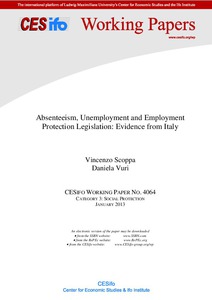Absenteeism, unemployment and employment protection legislation: evidence from Italy
"Efficiency wages theories argue that the threat of firing, coupled with a high unemployment rate, is a mechanism that discourages employee shirking in asymmetric information contexts. Our empirical analysis aims to verify the role of unemployment as a worker discipline device, considering the...
| Main Authors: | , |
|---|---|
| Institution: | ETUI-European Trade Union Institute |
| Format: | TEXT |
| Language: | English |
| Published: |
Munich
2013
CESifo |
| Subjects: | |
| Online Access: | https://www.labourline.org/KENTIKA-19129033124919472159-absenteeism,-unemployment-and-.htm |
| Summary: | "Efficiency wages theories argue that the threat of firing, coupled with a high unemployment rate, is a mechanism that discourages employee shirking in asymmetric information contexts. Our empirical analysis aims to verify the role of unemployment as a worker discipline device, considering the different degree of job security offered by the Italian Employment Protection Legislation to workers employed in small and large firms. We use a panel of administrative data (WHIP) and consider sickness absences as an empirical proxy for employee shirking. Controlling for a number of individual and firm characteristics, we investigate the relationship between worker’s absences and local unemployment rate (at the provincial level). We find a strong negative impact of unemployment on absenteeism rate, which is considerable larger in small firms due to a significantly lower protection from dismissals in these firms. We also find that workers who are absent more frequently face higher risks of dismissal. As an indirect test of the role of unemployment as worker’s discipline device we show that public sector employees, almost impossible to fire, do not react to the local unemployment." |
|---|---|
| Physical Description: | 35 p. Digital |

